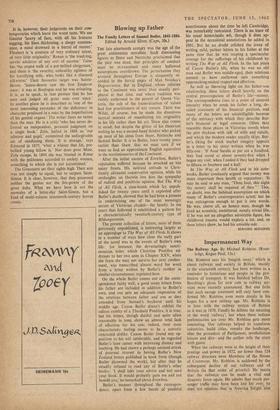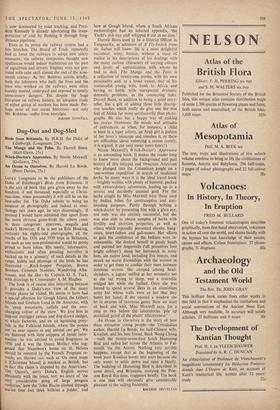Impermanent Way
The Railway Age. By Michael Robbins. (Rout- ledge, Kegan Paul, 15s.) MR. ROBBINS says his 'longish essay,' which is about railways and society in Britain, mainly in the nineteenth century, has been written as a reminder to historians and people in the pro- fession of transport. It was finished before Dr. Beeching's plans for new cuts in railway ser- vices were recently announced. But one feels that such savage treatment will only have con- firmed Mr. Robbins even more deeply in his hopes for a new railway age. Mr. Robbins is in love with the railway system of Britain as it was in 1870. Fondly he defines the meaning of the word `railway'; but when these tedious preliminaries are over Mr. Robbins gets more interesting. Our railways helped to transform industries, build cities, remake the landscape, alter the procedure of Parliament, revolutionise leisure and diet—and the author tells the story with gusto.
When the railways were at the height of their prestige and power in 1872, no fewer than 124 railway directors were Members of the House of Commons. Mr. Robbins is saddened by the subsequent decline of our railways and of Britain (in that order of priority). He insists that the railways can be made a vital' and dynamic force again. He admits that much pas- senger traffic may have been lost for ever; he does' not mention that in America freight also is now dominated by road trucking, and Presi- dent Kennedy is already advocating the trans- portation of coal by flushing it through long- distance pipelines.
Even in its prime the railway system had a few blotches. The Board of Trade repeatedly had to force the railways to adopt new safety measures; the railway companies thought new appliances would induce inattention on the part of signalmen and drivers. Engines were not pro- vided with cabs until almost the end of the nine- teenth century. As Mr. Robbins admits briefly, both the labourers who built the lines and the men who worked on the railways were often harshly treated, underpaid and exposed to totally unnecessary dangers. Yet despite the huge literature on railway history, no adequate study of either group of workers has been made. Per- haps most of our social historians—not only Mr. Robbins—suffer from nostalgia.
JEREMY TUNSTALL



































 Previous page
Previous page